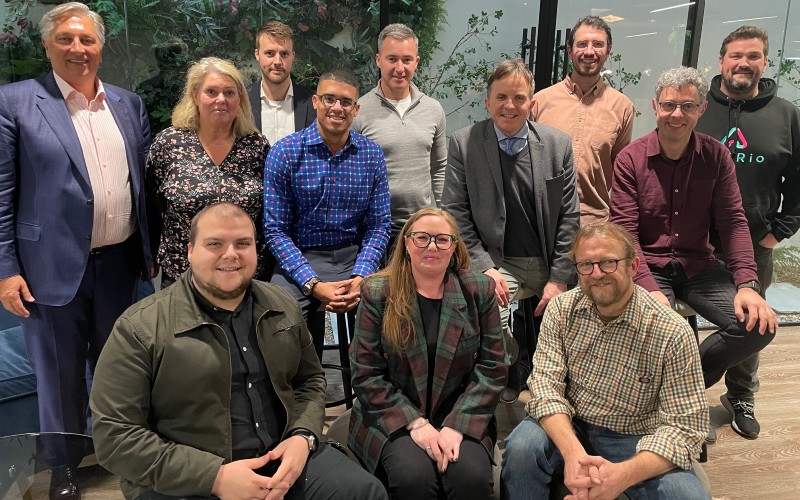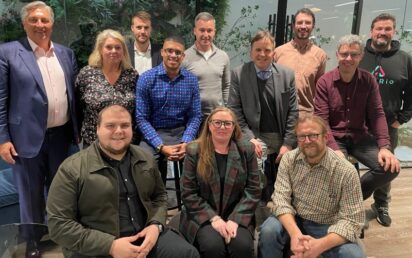The healthcare sector is at a crossroads but what direction should it take next?
BusinessCloud teamed up with leading accountancy firm Cowgills and several exciting HealthTech firms to discuss what needs to happen next to move the dial in healthcare.
1. James Kennedy, partner, Cowgills
James Kennedy is a partner at Cowgills and said raising initial investment can be the biggest obstacle. He said: “One of the challenges for young, aspiring healthcare companies is raising funding to reach a certain scale. Once they’ve hit the milestones for private equity, the sky’s the limit. Getting to that point is the challenge. When they come to raise investment for the first time they might not have the network of who to approach and how to package the products. My role is to be the bridge between packaging up the company in such a way that it will be attractive to potential investors and really seeing the opportunity.”
2. Emma-Louise Fusari, founder, In-House Health
Emma-Louise Fusari is a former nurse who launched In-House Health to tackle stress and burnout in the tech sector via a data-first approach. She said: “I think policymakers and decision-makers are behind the curve when it comes to digital health solutions. I think there needs to be more focus on innovation rather than duplication.” Fusari said more women needed to be encouraged into the sector. “HealthTech startups are three times more likely to be founded by men, despite the fact we have a 50/50 split in the population,” she explained. “We all want to have a greater impact on people’s health outcomes so there needs to be more women encouraged into the sector through investment, through academic programmes and by getting more girls and women into STEM fields in the first place.”
3. Alistair Williamson, managing director, Lucid Group
Alistair Williamson is the managing director of global healthcare consultancy Lucid Group. He said: “Innovation has to be seen as more important than regulation and benefiting patients as more important than backside covering.”
4. Glenn Cooper, chairman, Inovus Medical
Glenn Cooper is the chairman of Inovus Medical, which designs and manufactures surgical and medical simulation equipment. He said there are technologies that could transform the NHS. “We came out of some fantastic support from the NHS Clinical Entrepreneur Programme,” he explained. “For me if I could see that better adopted further and deeper into the NHS, I think there are technologies that can absolutely save a fortune and improve the performance in healthcare, like a commercial organisation would approach it.”
5. Jon Pickering, CEO, IMMJ Systems
Jon Pickering, CEO of IMMJ Systems, said he would like to see greater consistency across healthcare with mandated objectives given to integrated care systems (ICS) and NHS trusts. “That way NHS execs would understand what they need to achieve in order to reach a consistent level of digital maturity across the system,” he said. “What we’re finding is that trusts are working on their own individual strategies rather than something that is mandated centrally. It would be great if we had a regional joined-up approach to start with, and then we can look where we go on a national level. The transformation of turning paper records into usable data is massive.”
6. Phil Neilson, founder, AVERio
Phil Neilson is the founder of AVERio, which alerts care workers and family members to changes in a person’s activity or incidents, such as a fall. He said: “Having spent the last 15 years working in social care we need to bring social care out of the shadows of healthcare. They are the poor relation. It’s important to create more joined-up thinking, joined-up funding and joined-up delivery between health and social care. That would change everything.”
7. Lisa O’Neill, account manager, IEG4
Lisa O’Neill is an account manager at digital transformation specialist IEG4 and said getting the NHS to be open to innovation was critical to the future of the NHS. “As a company we have a good idea and a good product but how do we expand that?” she said. “The NHS is massive, it’s 1.3 million people. Surely there has got to be a clearer pathway for the NHS to access innovative solutions in a uniform and simpler way.”
8. Chris Barber, CEO, Lhasa
Chris Barber is the CEO of Leeds-based Lhasa, which accelerates the discovery pipeline of the life sciences industry. “There is much work within the NHS to digitise information,” he said. “While this is great, the greater opportunity will come when this information is standardised. Standardised data will allow us to learn from the past, predict the future and make changes that will improve future outcomes for patients. If the NHS could ruthlessly drive towards standardisation it would accelerate this transformative change towards disease prevention.”
9. Lee Chambers, founder, PhenomGames and Essentialise Workplace Wellbeing
Entrepreneur Lee Chambers is the founder of PhenomGames and Essentialise Workplace Wellbeing and said there needs to be more collaboration in healthcare. “From my perspective I do a bit of work with the British Medical Journal and Future Science so I see a lot of HealthTech startups with amazing products, implants and moonshot treatments,” he said. “What I don’t always see is joined-up networking spaces for best practices to be shared and for people to find supportive ways of working with each other. That would amplify future projects and present future collaboration opportunities.”
10. Tobias Nolan, co-founder, Candle
Tobias Nolan is the co-founder of the on-demand mental wellbeing support platform Candle and said there had to be a sea change in the way technology is regarded in healthcare. “It’s not about the computer science, it’s not about the code, it’s not about the engineering that goes into these great products,” he said. “Instead it’s about the social science and the behavioural science of the people who are going to use it. It’s also about normalising the use of things like a tech stack and understanding that there are tools to make your life easier, faster and simpler.”
11. Martin Fergie, CEO, Spotlight Pathology
Martin Fergie is the CEO of Spotlight Pathology, which is developing decision support tools for the diagnosis of blood cancers. He wants to see greater collaboration across healthcare. “I’d like to see support and networks for people who are from a technical scientific background who are trying to make that step into developing new products and services for access to people who are experienced in building commercial arguments both for the NHS and overseas health systems,” he said.


